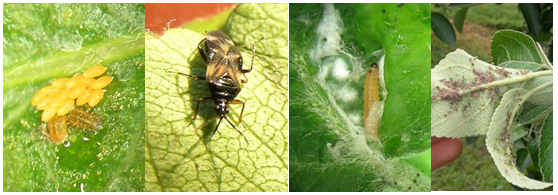As in previous years, winter 2018-2019 was a mild winter with the exception of January. Further on in the year there were some exceptional events in terms of temperature: there was already a spring day at the end of February and during the summer there were 3 heat waves and the highest measured temperature ever in our country of 39,°4C. Due to the high temperatures in the second half of February, phenological development started very early. In the spring of 2019, due to the regular rain showers, there was a very high infection pressure of scab. Due to the dry periods with sufficiently high temperatures in April to June, there were also sufficient days with favourable conditions for the development of primary and secondary white-disease infections.
As far as the development of insects is concerned, 2019 will be remembered mainly as the year with very many problems with aphids. In addition to aphids, there were also strikingly many problems with apple blossom weevils in 2019. Beetles in general have been on the rise for a number of years now due to the disappearance of some (more broadly effective) crop protection agents. Also stink bugs are causing more and more problems. The Asian brown marmorated stink bug Halyomorpha halys was not yet seen in our orchards in 2019, but it was observed in other non-fruit producing places. Also codling moth seems to regain importance, with locally strikingly early flights in 2019. Pear psyllids, on the other hand, was relatively manageable in practice in 2019, with significantly fewer black pears than in 2018.
In berry and stone fruit, the pest pressure of Drosophila suzukii in 2019 can be considered moderate throughout the year. Due to the exceptionally hot weather conditions during the second part of the cherry harvest (in which heat records were broken), the infestation of the fruit in commercial cherry plots remained rather low. Thereafter, the pest pressure was relatively low, probably due to the higher mortality rate and lower activity attributed to the extremely high temperatures and the extreme drought.

Contact: Tim Beliën (tim.belien@pcfruit.be) and Eva Bangels (eva.bangels@pcfruit.be)
Timing: Jaarlijks geëvalueerd
Financing: Vlaamse Overheid – Departement
